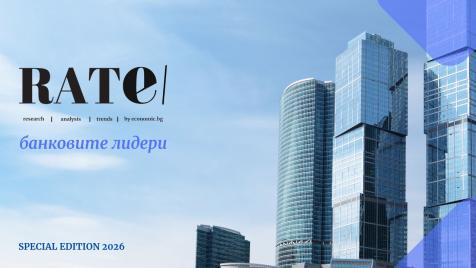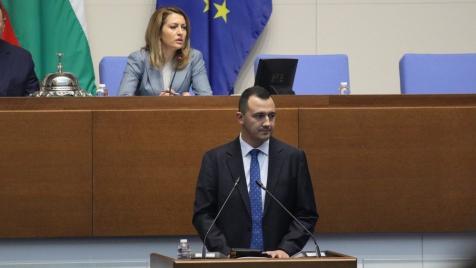Podcast | Every bank in Bulgaria can afford to pay 3.2% interest on deposits
In "a year or two" there will be almost no Bulgarians without a bank account
© ECONOMIC.BG / Krasimir Svrakov
Every bank in Bulgaria can afford to provide a higher interest rate on deposits and lower their fees on their services and products. This opinion was expressed by Georgi Talev, Vice President Office Network at tbi bank in the 11th episode of the Economic.bg podcast - Edno naum (Bear in mind).
Tbi bank, which ranks tenth in the country by assets, recorded record growth thanks to a surge in its customer base and assets. It also provides the highest interest rate on deposits in Bulgaria right now - 3.2% per year if the savings are locked for 36 months. The bank also has no fees on its current account.
We have no fees. We tried to provoke the market in this direction, unfortunately, others are not following yet. In my opinion, the banks should chase revenue through credit products, and not through fees," commented Talev.
According to his calculations, a standard current account with a debit card costs between BGN 0 and BGN 10 per month, depending on the bank the client chooses.
A look at the Bulgarian National Bank (BNB) reports shows that, in general, banks' profits are mainly due to their net income from interest on loans, while revenues from fees and commissions are actually not particularly high.
The deposit and investments
Bulgarians love bank deposits as a means of holding money, and even with zero interest rates on them until recently, they continued to put their savings in banks. In the last year, however, the deposit interest rates went up, with BNB statistics showing that they now average around 1%.
We can afford to pay a higher interest rate on the deposit and report lower revenues, although we are actually growing at a huge rate on the revenue side as well, thanks to our customer base. That means that any bank can afford to do this – it’s a matter of strategy and the direction in which it wants to go. It is not impossible, quite on the contrary," said Talev.
As alternative investment options, he pointed to bonds, whose yield can be higher than that of real estate, for example, which is the preferred investment option for Bulgarians.
"Bulgarians prefer to buy property – it’s considered safe, its price goes up, but the yield from the investment in a property on an annual basis is between 6 and 10%. There are currently already other instruments that also offer between 6 and 10%," he added.
The bank in your phone
The future of banking and the next big thing on the market will be the so-called ‘super app’. A tool from which a person can monitor his bills, but also where he can book a holiday, buy a TV or a theater ticket, or make an appointment with a doctor.
There are already such solutions in Europe, and the goal is to make our customers' lives easier. We are a few steps ahead of the others," Talev pointed out.
On a closer note, among the novelties in mobile applications is the saving option, which allows money to be set aside manually or automatically.
This teaches financial literacy and culture. You have to put some money aside. Not many banks offer it, but we are trying to break the ground," Talev pointed out.
At the same time, tbi bank is developing its physical branch network - in big and small cities, because "people need to meet people". However, these places are also digitized, and their future is mainly to serve as a place of consultation.
The ‘neon’ service
One of the distinguishing features of tbi bank is its neon service, which represents a combination of a debit card with a shopping limit for goods and services of up to 2,500 euros - the client does not owe interest if payment instalments last 3 months or less. The product is based on a Western model, and the interest-free option of payment instalments of up to 3 months is the most preferred, tbi bank's analysis shows. neon card users already exceed 100 thousand in number.
Bulgarians and the euro
In view of Bulgaria's possible entry into the Eurozone, the expectations of the vice president of tbi bank are that Bulgarians who have no bank account - currently between 12 and 16% of the active population - will drop to around 0% within "a year or two". According to him, the upcoming currency conversion is already causing people without a bank account to open one.
He emphasized the need for banks and the state to work more on informing people about the currency change and emphasized that the government was already late in starting the information campaign about this.
Talev also drew attention to the fact that conversion from lev to euro in tbi bank is already carried out according to BNB fixing.
No one but us does it, and I don't know if people are aware that they can lose 6-7 BGN per 1,000 BGN during currency conversion. If we look at it in general at the country level, we are talking about millions of BGN that we can save on our customers and we are moving in that direction," commented Talev.
This article was prepared with the assistance of tbi bank.
Translated by Tzvetozar Vincent Iolov

 Antoniya Simova
Antoniya Simova 


